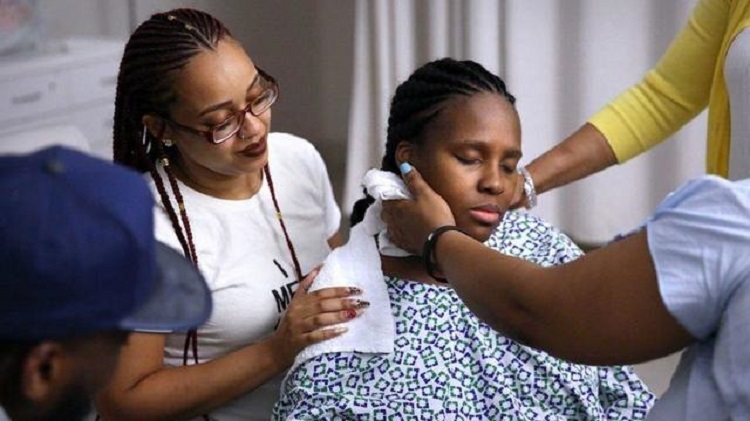
Black birth workers support sacred birth and self-determination for Black mamas
September 6, 2017In a room filled with bright lights, Janeal, entered her active stage of labor. With each contraction, she yelled and screamed. I held her hand and reminded her to breathe. Her hands were warm and soft. This was her second birth and her worst fear was to have a c-section or have doctors unnecessarily cut her vagina. In between each contraction, I rubbed her back and feet as she repeated affirmations of “I trust my body” out loud. A couple hours later, she was holding her beautiful baby girl in her arms. She had a successful vaginal birth and most importantly for her, no scissors to her vagina with an episiotomy.
Birth is sacred and birth workers play a critical role in supporting a family with accepting a new baby into this world. While we know that this is a growing field for all racial identities, Black women are uniquely able to better support each other in birth because we experience and understand the impacts of racism on our relationships, to our bodies, and our ability to self-determine our health care.
In order to support a client who is Black, you must either share their experience and be able to provide support to get them through it, or understand your privilege enough to support them. Janeal was my first doula client who at the time was a 17 year-old Haitian Black girl. She was homeless, on her second pregnancy and needed extra support. Her boyfriend was in Haiti and her family was not supportive. Employers saw her through the lens of racism, age discrimination and xenophobia, not wanting hire a young Black, immigrant who was also pregnant. This stressed her out. As her doula, I knew that we had to find ways for her to not be stressed because this is the leading cause of complications like high blood pressure and preeclampsia in pregnancy.
We both shared Haitian ancestry and the experience of young mamahood. I used several opportunities during our prenatal visits to ask her critical questions and explained that she was not alone in what she was going through nor was she to blame. Every year, thousands of Black women have adverse birth outcomes and in fact, the statistics are daunting. Black women are 4 times more likely than white women to die during childbirth. According to World Health Organization, the major complications that account for nearly 75% of all maternal deaths are: severe bleeding (mostly bleeding after childbirth), infections (usually after childbirth), high blood pressure during pregnancy (pre-eclampsia and eclampsia), complications from delivery, and unsafe abortion. All of which are preventable. Black birthworkers often times use homeopathic remedies to intervene and impact these adverse outcomes. Janeal and I researched natural and herbal remedies for blood cleansing; developed a more nutritious meal plan without taking her out of her normal Caribbean meal plan and began doing deep meditations to get her to believe in and trust her body.
Together, we would say, “I am powerful. My body has been preparing for this birth. I am ready to birth my baby,”as a way to begin thinking about her pregnancy and delivery in a safe and healthier way.
For a young Black woman, thinking about the fears of birth impacts their ability to make an informed decision about whether and how they will have children. We often had long conversations about systemic oppression and through some political education on reproductive oppression, including sharing statistics, videos, and stories of my own births, she was empowered to have a healthy birth for herself and the rest of Black women in the world, against all odds. She was growing to become a social justice advocate for herself and her community.
Social justice can positively impact health equity because it seeks to address the other issues that a Black mama may be facing that impacts her ability to have a safe and healthy pregnancy. Black Mamas Matter is an alliance created to attack those disparities head on, in and outside of the health system. Recognizing that if health care providers, advocates, birth workers, can work together to understand that Black Women need more than health care and work to eliminate systemic oppression which creates racial disparities than we could address the problem at its root.
At 39 weeks, Janeal had a healthy baby girl. No c-section and no episiotomy, both of which she named that she did not want on her birth plan. I was honored to be a light to remind her that she as human being has her God given birthright to exist and determine for herself how she wanted to give birth and live a dignified life. It is my hope that more Black women can continue to be a light for one another.